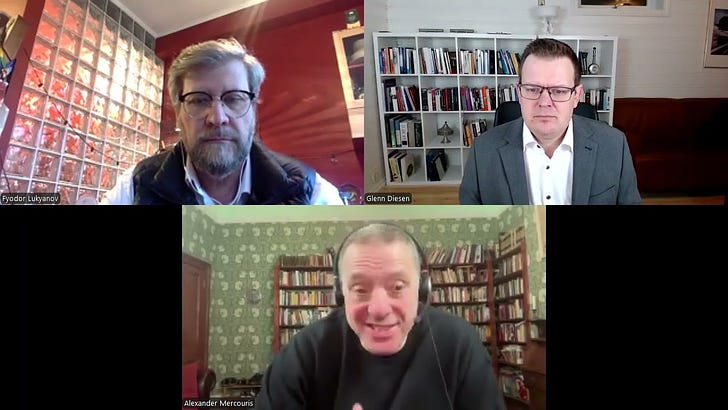Russia's Eurasian Future After the Ukraine War
Fyodor Lukyanov, Alexander Mercouris & Glenn Diesen
I had a conversation with Fyodor Lukyanov and Alexander Mercouris on the end of the Ukraine War and Russia’s Eurasian future. Fyodor Lukyanov is editor-in-chief of Russia in Global Affairs, chairman of the Presidium of the Council on Foreign and Defense Policy, and research director of the Valdai International Discussion Club.
We discussed three topics:
How will the Trump presidency contribute to end the Ukraine War? Trump wants to end the war but it is unlikely that his negotiation skills in business are transferable to politics. In early 2022 there was a good compromise available as Russia offered to withdraw its troops in return for Ukraine restoring its neutrality. However, after the agreement was sabotaged by Washington the scope for a reasonable compromise seems to be gone. Russia still demands that Ukraine restore its neutrality, yet Ukraine will expect some security guarantees after all its suffering in this war. Furthermore, Russia expects territorial concessions as four oblasts were annexed during the war. It will be difficult for Trump to bridge this divide, and Russia will not accept any temporary ceasefire (Minsk-3) that will give NATO time to rearm Ukraine to fight Russia again in the future.
Russia’s Eurasian future. Peter the Great began Europeanising Russia 300 years ago after the victory over Sweden in the Great Northern War in 1721. Following three centuries of Western-centric foreign policy and looking to the West for development, Russia has made a decisive shift to the East by abandoning the Greater Europe ambition with Greater Eurasia. The objective is not to be anti-Western or pro-Western, but to merely make the West less important for Russia by diversifying its partnerships.
Pragmatic US versus ideological EU. The US is more pragmatic in terms of restoring and improving relations with Russia if it serves US national interests. The EU, gripped with ideology that divides the world into good versus evil, is less likely to restore relations with Russia even if it serves the national interests of its member states. An entire political class has risen over the past decades believing that the EU was the manifestation of the liberal peace, a force for good that had transcended the power politics of the past. The EU elites do not have the flexibility to engage in course-correction. The EU will purchase Russian energy more expensively via India and deindustrialise to uphold the pretense of following failed sanctions, and reject basic diplomacy even as the continent is ravaged by war. Russia will likely engage with the West through the US, and ties with the Europeans will be limited.




The Nordic Council has just had a meeting, and all delegates agreed on more military rearmament for war against Russia. These are the same people who have now for 30 years shouted themselves hoarse with their will to be a member of the EU. An EU that has deprived all individual states of all national rights, they are not even allowed to show their country's flag in parliament. The entire Nordic region has ceased to exist as independent and sovereign countries. The last two that just submitted to the American war mafia Nato were Finland and Sweden. And these same people claim they fear that Russia will attack us and take over.
It takes a very special kind of complete idiot to be installed in their roles...
This was a really valuable discussion, and I was especially struck by Fyodor Lukyanov's assessment of Russian opinion and its approach to achieving victory. There was not much discussion of idea of Eurasian security arrangements without external powers (i.e. USA), which was discussed between Xi and Putin I recall. I think you are too kind of the pragmatic USA in your summary. They are driven by the ideology of American Primacy, and the interests created by American occupation of both ends of Eurasia since 1945.